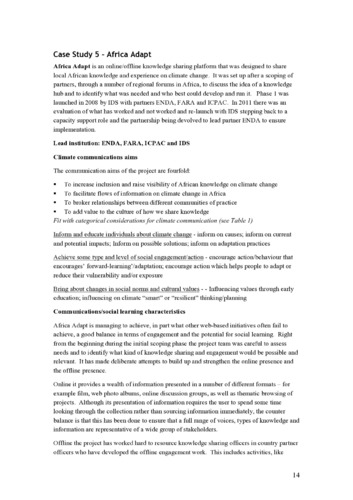Africa Adapt
Abstract
Africa Adapt is an online/offline knowledge sharing platform that was designed to share local African knowledge and experience on climate change. It was set up after a scoping of partners, through a number of regional forums in Africa, to discuss the idea of a knowledge hub and to identify what was needed and who best could develop and run it. Phase 1 was launched in 2008 by IDS with partners ENDA, FARA and ICPAC. In 2011 there was an evaluation of what has worked and not worked and re-launch with IDS stepping back to a capacity support role and the partnership being devolved to lead partner ENDA to ensure implementation.
Lead institution: ENDA, FARA, ICPAC and IDS Climate communications aims
The communication aims of the project are fourfold:
• To increase inclusion and raise visibility of African knowledge on climate change
• To facilitate flows of information on climate change in Africa
• To broker relationships between different communities of practice
• To add value to the culture of how we share knowledge
Communications/social learning characteristics:
Africa Adapt is managing to achieve, in part what other web-based initiatives often fail to achieve, a good balance in terms of engagement and the potential for social learning. Right from the beginning during the initial scoping phase the project team was careful to assess needs and to identify what kind of knowledge sharing and engagement would be possible and relevant. It has made deliberate attempts to build up and strengthen the online presence and the offline presence.
Online it provides a wealth of information presented in a number of different formats – for example film, web photo albums, online discussion groups, as well as thematic browsing of projects. Although its presentation of information requires the user to spend some time looking through the collection rather than sourcing information immediately, the counter balance is that this has been done to ensure that a full range of voices, types of knowledge and information are representative of a wide group of stakeholders.
Offline the project has worked hard to resource knowledge sharing officers in country partner officers who have developed the offline engagement work. This includes activities, like “Meet and Greet” where staff set up fairly impromptu meetings to discuss particular issues or visit a particular village to share experiences. These events are then shared on the website by film
It is felt that one of the reasons for this growing success is that there is a strong culture of reflection and learning within the project team itself and regular meetings and discussions on what Africa Adapt’s USP is and how it fits with the range of other climate change information and networking projects take place. This has helped to keep the focus and really look where engagement works and where it does not. This kind of project is expensive but knowing where you add value helps to justify the support.
Audience:
It was originally intended to speak to policy makers and others working in climate change adaptation in Africa and elsewhere. It considers that the audience that has responded the most to this format has been practitioners or those working one step away from communities. It is not so much of a recognised tool for policy makers.
Getting research into use (how this case study does or does not contribute to that):
Africa Adapt is an attempt at getting local and global climate change knowledge discussed more widely and that knowledge put in to practice. As part of the monitoring and evaluation of the approaches Africa Adapt has taken in getting research in to practice, they carried out interviews to assess where people in the network had seen real world behaviour change: “stories of change”. The stories of change help to act as supporting evidence and demonstrate a number of uses of material from the Africa Adapt website that communities have used as teaching aids or opportunities for learning.
Evolution of the project (how has the project evolved or developed if known):
The project has put in mechanisms to help learn what is working well – for example the stories of change process mentioned above. The phase one project evaluation also encouraged a re-think on how to integrate the online and offline activities. One outcome was a decision to take more time to have online discussions using DGroups to bring the physical network and communities of practice together virtually. This emphasis on trying to build up further engagement and learning is well on its ways to providing a good platform for increased social learning.

